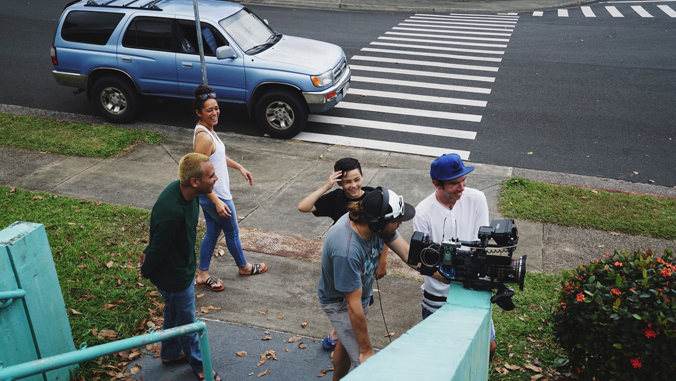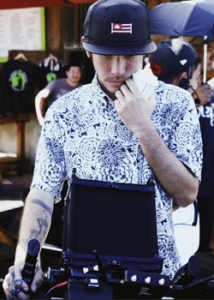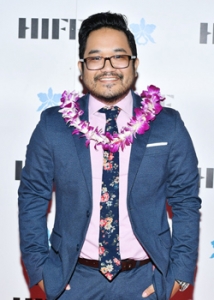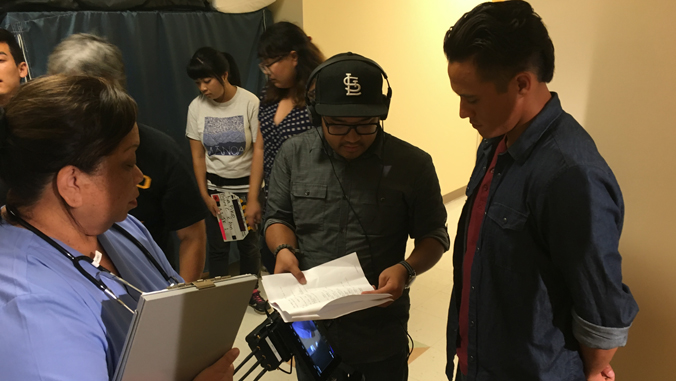
An inaugural list of the nation’s best Indigenous film and television writers includes two University of Hawaiʻi alumni.
Alika Maikau and Bryson Chun were named to The Indigenous List, selected by The Black List, in partnership with IllumiNative and the Sundance Institute. To be considered, Indigenous artists needed to submit film or TV scripts, and describe how their native culture supported their ideas and process as a screenwriter. Maikau and Chun, who are friends and of Native Hawaiian heritage, were among nine writers chosen nationally.
“This initiative to highlight Indigenous voices was really exciting because there aren’t a lot of really positive portrayals of native people on TV or on the screen so it’s really exciting that The Black List, along with Sundance and IllumiNative, they all came together to find native voices that were underrepresented in media,” Chun said. “It’s a big deal. I’m really excited to be included on that list.”
Maikau added, “It was surreal and unexpected. To have two of the nine be Hawaiʻi-based films was really special to me and we just want to represent Hawaiʻi as best as we can.”
Maikau’s Molokaʻi Bound

Molokaʻi Bound, the script Maikau submitted, is about a man named Kainoa who spent several years in prison. After being released, he wants to reestablish a relationship with his son and his Hawaiian heritage. However, old friends and new developments threaten to derail his path.
Maikau created a short film last year based on a scene from his full Molokaʻi Bound script, which won an award for best live-action short film at the 2019 imagineNATIVE film festival in Toronto, qualifying it for the 2021 Oscars. He hopes to eventually create a film using the entire script.
“We wanted to turn that momentum into the feature film,” Maikau said. “When we went into lockdown, that shifted the timetable. I completed the script at the end of last year so I’ve been refining it and trying to recalibrate and figure out how we can best adapt the script into a feature in 2021.”
Maikau, who has lived in Kāneʻohe his entire life, said his work has been inspired by Hawaiʻi’s people and specifically, the Native Hawaiian community.
“Most of my work is based on people that I knew growing up or were adjacent to or heard stories about and I’ve always felt like the Native Hawaiian community is such a vibrant community full of stories waiting to be told,” Maikau said. “My work is an attempt to start to explore some of that and hopefully offer a different perspective.”
He graduated from Castle High School, then went on to UH Mānoa to earn a bachelor’s degree from the Academy for Creative Media (ACM) in 2012.
“I had strong, cerebral professors, who introduced me to the world of Indigenous cinema, and helped me to tap into my indigeneity through film,” Maikau said. “They broadened my understanding of what a Native Hawaiian film could look like, the impact this type of art could have and how to yield that power for the good of the community.”
Chun’s Poi Dogs

Chun’s script, Poi Dogs, is about a Hawaiʻi Island dog groomer named Olivia, whose world is flipped upside down when she finds out from the FBI that someone put a hit on her on the dark web. Chun calls it a crime-thriller as Olivia tries to figure out who did it and how she can escape.
“It’s the pilot of a TV show,” Chun said. “It would be incredibly hard to make it myself but it would be really cool if somebody wanted to buy the script or produce it. But I also think of it as a writing sample as well, so it’s cool to get my work out there and hopefully somebody sees it and maybe I can get more opportunities out of it.”
Like Maikau, Chun grew up in Windward Oʻahu, starting in Kailua then moving to Kahaluʻu. He credited his influence from his education at Kamehameha Schools Kapālama, which he attended from the fourth grade through high school.
“The thing that I loved most about my experience there was that while there was the rigor of academics, they really did encourage you to explore the arts so I spent a lot of time doing music (band), doing some theater, and there was a culmination of all of those things that got me into film,” Chun said. “I do think it’s a native approach to be holistically well-rounded.”
Before earning a bachelor’s degree in English from UH West Oʻahu in 2016, Chun took several ACM courses at UH Mānoa. He credited the program with highlighting efforts to tell Hawaiʻi films.
“There are a lot of people in our native film community that have some association with ACM so it really was a place for all of us to come together and meet each other and that extends into our film community today,” Chun said. “We are all a community that works together and builds each other up. There’s no competition between us. Everyone is very supportive of each other’s work.”
—By Marc Arakaki


